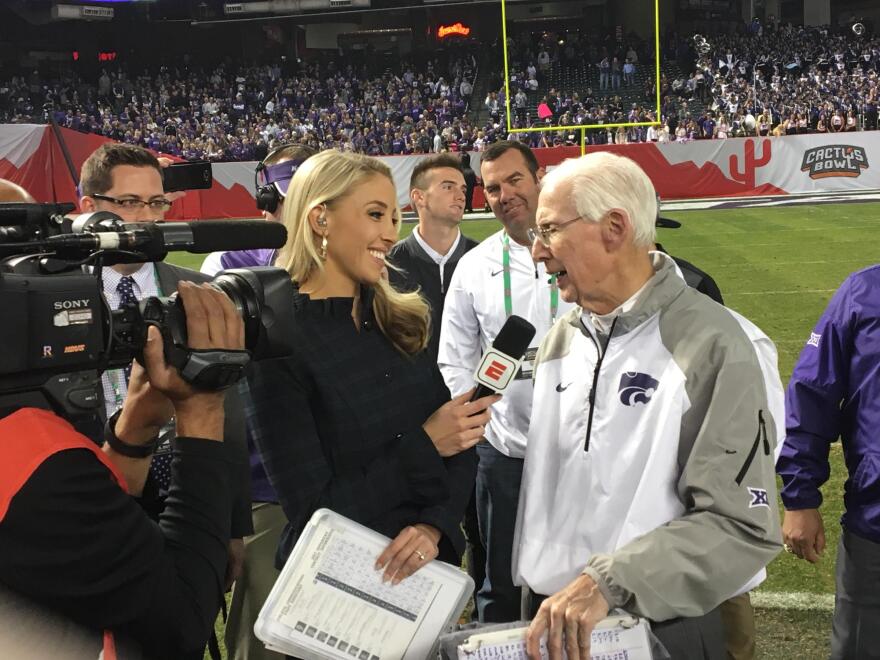The four-lane road that connects Manhattan, Kansas, and I-70 is wider and busier now than it was when Bill Snyder took over as Kansas State’s football coach in 1989.
So much so that it’s named after Snyder, who has more than 200 wins at K-State, making him only the sixth person to do that with one football program.
Snyder is 78, the oldest coach in the top division of college football. And while his 26th season with the team ended Tuesday with a 35-17 win over UCLA in the Cactus Bowl, he says he isn’t sure whether he’ll return next season.
And that uncertainty makes K-State fans apprehensive.
“He’s put the wind in the sail, and he’s brought notice to Manhattan,” says Brad Everett, a general manager at the Hilton Garden Inn in Manhattan.
Everett, who grew up in Manhattan, has seen first-hand how the town’s hotel business has grown. The number of available rooms has almost doubled since 1995, from 696 to 1,326, according to the Manhattan Area Chamber of Commerce.
“The economic winds have certainly carried, especially on the football weekends from the hotel standpoint, where we’d cry and wish and hope for rooms to be sold,” Everett says. “We eventually required two nights for people to go ahead and stay, which they were.”
But it isn’t just about hotel rooms and better roads.
Between 2011 to 2015, K-State spent about $205 million to improve its athletic facilities. An economic impact study, conducted by the Texas firm Angelou Economics, says 87 percent of the money ($178.5 million) went to improving the football program and the now 50,000-seat stadium.
It hardly resembles the 35,000-seat venue that opened almost 50 years ago. Neither do today’s teams compared to back then.
“I was there before Bill Snyder was there, and I was there while Bill Snyder was showing up. It’s like we were nothing,” Kansas State fan Michael Johnson says. He lives in Arizona and attended the Cactus Bowl in Phoenix, where purple-clad people dotted the stands.

Johnson and other Wildcat fans have emerged from a slumber that lasted for decades before Snyder. Three times in the last five years (2013, ’14 and ’15), K-State was second in the nation for filling its home stadium to capacity.
What Snyder decides to do, though, is certain to have an impact.
Almost a year ago, Snyder was diagnosed with throat cancer, which is in remission after treatment. And though his contract is technically up, he has a clause that allows him to coach for as long as he wants. Snyder said last week that he doesn’t know whether he’ll coach in 2018.
“I need to have more dialogue with my family,” he says. “I’ve had a dialogue with our administration, and I need a little bit more dialogue with them.”
That has fans like Syd Winter, a former Kansas resident who lives in Chandler, Arizona, worried.
“When Coach (Snyder) steps away, yeah, there’s a concern,” Winter says. “We saw it in the three years when he did step away.”
Winter is referring to when Snyder left for three seasons (2006-08) and K-State hired Ron Prince. Prince had two losing seasons, prompting Snyder to return. Since then, the Wildcats have gone to eight straight bowl games.
There is someone waiting who could take over — Snyder’s son, Sean, who is an associate head coach and special teams coordinator. Yet, Topeka Capital-Journal K-State beat writer Ken Corbitt says Bill Snyder doesn’t share many thoughts, so “it’s impossible to get into what he’s thinking.”
“He doesn’t give anything away. I don’t even know how much he gives away to his staff and his family. He lives in his own world, I believe, but he knows what he is doing,” Corbitt says.
One thing is for sure: Snyder knows how to coach. He’s one of the few to be inducted into the College Football Hall of Fame while still on the job.

